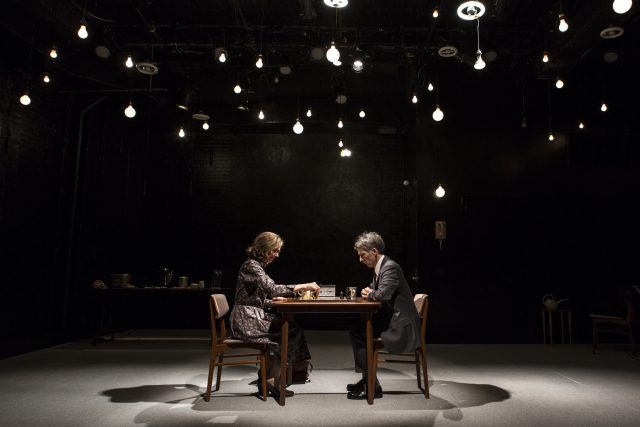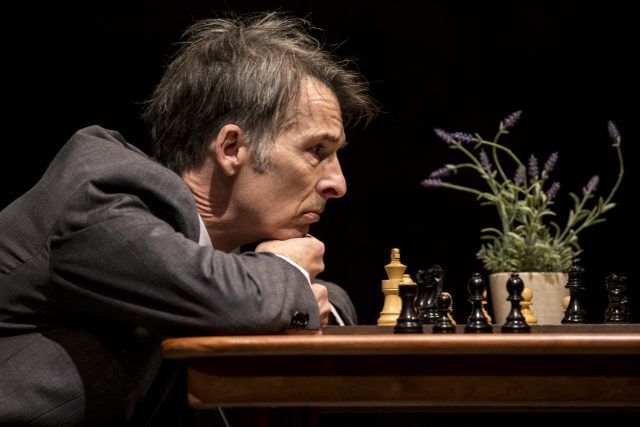
A man (Will Bond) and a woman (Ellen Lauren) play chess and discuss art and life in SITI Company world premiere (photo by Maria Baranova)
June Havoc Theatre, Abingdon Theatre Company
Abingdon Theatre Arts Complex
312 West 36th St. between Eighth & Ninth Aves.
Tuesday – Sunday through April 2, $57
212-868-2055
abingdontheatre.org
siti.org
On March 5, 1968, revolutionary artist Marcel Duchamp and revolutionary composer and musician John Cage sat down for a game of chess for the performance Reunion at the SightSoundSystems festival in Toronto. As a bonus, each of the squares on the board was wired with a unique sound. Duchamp had previously said, “I have come to the personal conclusion that while all artists are not chess players, all chess players are artists.” Art and chess, as well as everyday life itself, blend together in unique ways in SITI’s world premiere of Chess Match No. 5, which opened Sunday at the Abingdon Theatre. In the ninety-minute work, conceived and directed by SITI Company cofounder Anne Bogart, He (Will Bond as a stand-in for Cage) and She (Ellen Lauren) meet in a relatively spare room to play a few games of chess. They also discuss art and life using text adapted from actual Cage conversations, adapted by Jocelyn Clarke. “I wouldn’t say that we are interested in destroying the barrier between art and life or even blurring it,” the man tells the woman early on. “I would say that we are interested in observing that there is no barrier between the two.” Through cleverly choreographed staging (there’s even a little dancing), the dialogue, so much of which is dry and didactic (as well as often being revelatory and very funny), never bogs things down; in fact, it all becomes rather playful. “I think life, when we have it, is the paying of attention,” the man opines, as if making sure the audience is listening closely. “Some people pay attention with their eyes and some pay attention with their ears. I enjoy paying attention with both my eyes and my ears, and I think that as a result my work has a theatrical quality – or ‘character’ is a better word – because theater is the use of both eyes and ears.” Brian H Scott’s lighting features several dozen hanging bare bulbs of different shapes and sizes; the man occasionally calls out a number and the lighting suddenly changes. Meanwhile, Tony, Obie, and Drama Desk Award winner Darron L West’s superb sound design is like a character unto itself.

A John Cage stand-in (Will Bond) contemplates his next move in CHESS MATCH NO. 5 (photo by Maria Baranova)
At the front of the stage is a large, old-fashioned Lloyd’s transistor radio, at the rear a table with bread, a toaster, and coffee. When the man uses the items, he makes a series of sounds that recalls Cage’s “Water Work,” which the composer performed with everyday household objects. Other participants in the sound landcape include a chess timer, a rotary phone, and traffic. As they play chess and wander around James Schuette’s set, the man and the woman talk about Erik Satie, the sound of silence, multiplicity, Zen, anarchy, Mozart, the role of the artist, and sleep and even tell a few existential jokes. They also are fully aware of the audience, occasionally addressing them directly. Bond’s fluid, sometimes tongue-in-cheek delivery and calm manner keep the dialogue from becoming boring (although he does note, “Boredom is not so bad and not really boring, you know.”) But if you’re looking to make sense of it all, you’re out of luck. “I’m on the side of keeping things mysterious, and I have never enjoyed understanding things,” the woman explains, offering guidance to potentially confused onlookers. “If I understand something, I have no further use for it.” Always innovative Obie and Bessie Award winner Bogart (Room, No Plays No Poetry But Philosophical Reflections Practical Instructions Provocative Opinions and Pointers from a Noted Critic and Playwright) directs with a sly smile, enjoying the play’s — and the characters’ — many idiosyncrasies. If you submerse yourself in the concepts and ideas being espoused by the man and the woman (as well as the outstanding sound and lighting), you’re likely to enjoy Chess Match No. 5, which is the anchor of a larger SITI project called Theater Piece #1; however, if you need your shows to have a more straightforward narrative in which traditional things actually happen, well, this just might not be your kind of game, which would be a shame. “This is an odd way to have a conversation,” the man says. It sure is. Check and mate.